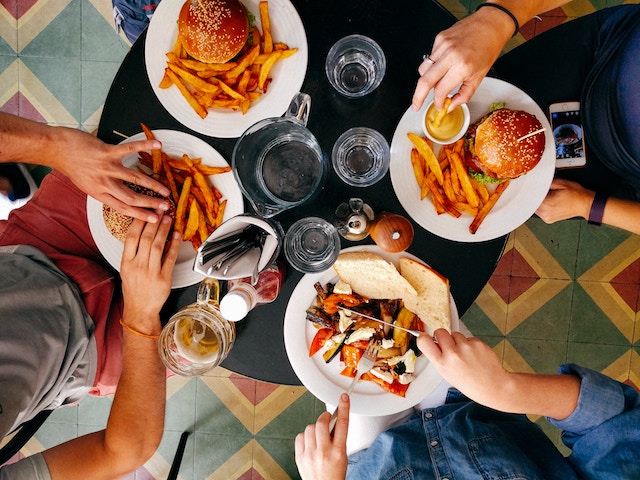A few months ago, we became weekday vegetarians.
Like many yogis, I had been vegetarian on and off for some time —but I always felt a bit torn when it came to eating versus not eating meat; meatless weekdays brought a perfect resolution to this personal dilemma.
I’m not the only one. A lot of people are rethinking the way they eat and what place meat should have in their diet. TreeHugger Founder Graham Hill explains in his TED talk how he decided to be a weekday vegetarian—he argues that because it is structured, it’s simple to remember. Also, it has reduced his footprint, he’s healthier…and he has even lost some weight.
Two kinds of weekday vegetarians are emerging: ‘ex-vegetarians’ who occasionally eat meat and meat-eaters, who want a more plant-based diet.
Meatless weekdays brings peace of mind for those who feel they are failing their vegetarian ambitions and it gives a structure to the carnivores who want to reduce their meat intake.
At home, we have been really relaxed, playful and curious about the whole experiment and probably because of this laid-back attitude, we have adopted this new lifestyle with surprising ease. Here are a few tips that made it easy for us:
1. Pimp up your pantry.
Invite new friends onto your shelves!
Pulses are going to dominate your weekdays. Although lentils and chickpeas are wonderfully versatile, there are many more beans and peas you can include to your rolling shopping list: cannellini beans, butter beans, split peas and turtle beans to name a few.
Also, get wild with your carbs—start stacking bags of all sorts: bulgur wheat, quinoa, giant couscous, pearl barley and various kinds of rice: arborio for risottos, brown rice for pilaffs, and wild rice, for special occasions.
2. Dine out in vegetarian restaurants or have your lunch at your local veggie cafe.
Not only it will get you into the habit of eating out vegetarian—but it will give you some great ideas to do at home. You need a bit of imagination to cook veggies five days a week, so get the inspiration wherever you can!
3. Get the right cooking gear.
There is a lot of chopping involved in vegetarian cooking, so you need reliable knives and ideally, a food processor.
The other great companion to veggie cuisine is the pressure cooker.
I’ve become very boring to my friends on this subject but they will have to be patient: I’m on a mission and I’m convinced that if each household had a pressure cooker, the world would be a better place. Pressure cookers are wonderful to cook pulse stews and in many cases, you can skip the soaking phase—most of the time, your dish will be cooked in 15-30 minutes, instead of one hour or more.
4. Become a food geek.
Keep your Pinterest food boards exciting and start hoarding recipes you find online.
Invest in nice recipe books; cookery books can be pricey, so they are a great gift idea to put on your wish-list for birthdays, Christmas and anniversaries.
A good cookbook becomes a companion for a lifetime. My two personal bibles are a French classic by Ginette Mattiot and the other one is the Rodale Whole Foods Cookbook.
5. Less chicken, more eggs.
If you don’t have any cholesterol or weight concerns, eggs are the superfood (and I’m quoting my doctor here). They are a very affordable source of protein; it’s time to explore those quiche, frittata and Spanish tortilla recipes!
6. Wise up about nutrition.
A shift in diet is a good opportunity to educate yourself about nutrition.
Peel off those tired-looking magnets from your fridge door and use them to post shiny print-outs of nutrition charts about pulses, vegetables, fruits, carbs, nuts and seeds.
7. Veggie junk food night.
These are great to keep it fun and cheerful! At home, it’s usually Friday night and it can consist of pizza—or some kind of homemade, tex-mex delight.
8. Get the creative juices flowing.
Once you’ve found your feet with your veggie cooking, you can improvise! Be daring and inventive!
Try to cook something new, once a week, so your culinary culture broadens. This goes for all things: the more knowledgeable, the more confident, the more efficient, the more creative.
9. Two is better than one.
Cook at least two meals at once—that’s where once again, the pressure cooker is handy (just saying).
Then, you can either freeze or take your veggie leftover in your lunchbox. The beauty of cooking in advance is that stews and tomato sauces taste better the following day.
10. Choose the right meat.
Now that your budget is shrinking because you spend no money on meat during the week, you can indulge in quality, organic meat, when Saturday comes.
If you are worried that you are not finding enough iron during the week, offal might be the food for you; ask your organic butcher for some fresh chicken liver and make a nice salad for your Sunday lunch.
11. One fishy day.
Now it’s a bit controversial but we do sneak in a fish meal during the week; it serves as reminder to eat fish!
Otherwise, we are quite partial to smoked salmon and egg benedict for weekend brunches.
12. It’s okay to stray.
Rules are, after all, meant to be broken. Dedication is a laudable quality but it doesn’t have to come with rigidity.
Once in a while, on a Friday evening, our chilli will be with carne and our burger will be beef, instead of beans.
Special occasions also call for more permissiveness, when travelling abroad or staying with friends of family, it’s sometimes easier to just take a short break from veggie weekdays. When we come back home, however, we do crave our good old veggie dishes.
In the process of the last few months, they have become the taste of home food.
More tips about vegetarian cooking.
~
Editor: Bryonie Wise
Like elephant food on Facebook.







Read 18 comments and reply